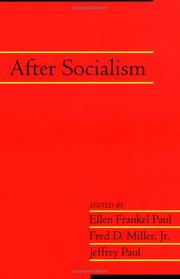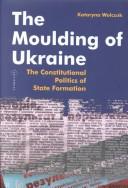| Listing 1 - 10 of 94 | << page >> |
Sort by
|

ISBN: 0511550103 0521534984 Year: 2003 Publisher: Cambridge : Cambridge University Press,
Abstract | Keywords | Export | Availability | Bookmark
 Loading...
Loading...Choose an application
- Reference Manager
- EndNote
- RefWorks (Direct export to RefWorks)
In this collection, twelve philosophers, historians, and political philosophers-scholars with a diverse set of disciplinary and political leanings-assess aspects of socialism in light of its recent reversals. Some of the essays consider what made the socialist project seem compelling to its advocates, examining the moral and political values that made socialism appealing to intellectuals. Others evaluate whether there are aspects of socialism that ought to be preserved, such as its quest for equality and community. Some essays examine whether free-market systems need to be further modified in response to ongoing socialist critiques. Several others argue for the continuing validity of socialism in its social democratic incarnation, suggesting ways in which socialism may still have a productive future. Still others condemn the socialist project as inherently misguided in theory, while also portraying 'really existing socialism' as cataclysmic in practice.
Post-communism. --- Postcommunism --- World politics --- Communism --- Arts and Humanities --- Philosophy
Book
ISBN: 9633863716 9633863708 9789633863701 Year: 2020 Publisher: [s.l.] : Central European University Press,
Abstract | Keywords | Export | Availability | Bookmark
 Loading...
Loading...Choose an application
- Reference Manager
- EndNote
- RefWorks (Direct export to RefWorks)
"This book offers a single, coherent framework of the political, economic, and social phenomena that characterize post-communist regimes. Focusing on Central Europe, the post-Soviet countries and China, the study provides concepts and theories to analyze the actors, institutions, and dynamics of post-communist democracies, autocracies, and dictatorships. The work explores the structural foundations of post-communist regime development; the types of state, with an emphasis on informality and patronalism; the types of actors in the political, economic, and communal spheres; the ways autocrats neutralize the institutions of public deliberation (media, elections, etc.); the color revolutions of civil resistance (as in Georgia and in Ukraine) and the defensive mechanisms of democracy and autocracy; the evolution of corruption and the workings of "relational economy"; an analysis of China as "market-exploiting dictatorship"; the sociology of "clientage society"; the instrumental use of ideology, with an emphasis on populism; and a six-regime framework for modeling regime trajectories. Written in textbook style, the book is suitable for both beginners who wish to understand the logic of post-communism and scholars who are interested in original contributions to comparative regime theory. The book is equipped with QR codes that link to a website, which contains interactive, 3D supplementary material for teaching"--
Book
ISBN: 1316446662 131644709X 1316393054 1316447529 131644967X 1316447952 1107121264 1107549272 1316444082 9781316449240 1316449246 9781316449677 9781107121263 9781316393055 9781107549272 Year: 2015 Publisher: Cambridge : Cambridge University Press,
Abstract | Keywords | Export | Availability | Bookmark
 Loading...
Loading...Choose an application
- Reference Manager
- EndNote
- RefWorks (Direct export to RefWorks)
The first political theory of post-Communism examines its implications for understanding liberty, rights, transitional justice, property rights, privatization, rule of law, centrally planned public institutions, and the legacies of totalitarian thought in language and discourse. The transition to post-totalitarianism was the spontaneous adjustment of the rights of the late-totalitarian elite to its interest. Post-totalitarian governments faced severe scarcity in the supply of justice. Rough justice punished the perpetrators and compensated their victims. Historical theories of property rights became radical, and consequentialist theories, conservative. Totalitarianism in Europe disintegrated but did not end. The legacies of totalitarianism in higher education met New Public Management, totalitarian central planning under a new label. Totalitarianism divorced language from reality through the use of dialectics that identified opposites and the use of logical fallacies to argue for ideological conclusions. This book illustrates these legacies in the writings of Habermas, Derrida, and Žižek about democracy, personal responsibility, dissidence, and totalitarianism.
Post-communism. --- Totalitarianism. --- Totalitarian state --- Authoritarianism --- Collectivism --- Despotism --- Dictatorship --- Fascism --- National socialism --- Postcommunism --- World politics --- Communism
Book
ISBN: 1108752462 1108499910 1108718663 1108604129 1108607365 Year: 2019 Publisher: Cambridge, England : Cambridge University Press,
Abstract | Keywords | Export | Availability | Bookmark
 Loading...
Loading...Choose an application
- Reference Manager
- EndNote
- RefWorks (Direct export to RefWorks)
The collapse of the communist monopoly across Central and Southeastern Europe in 1989/1990 initiated a process of rapid political, economic, and cultural change. While Bosnia-Herzegovina, Croatia, and Serbia went on to suffer three and a half years of war, all the states of the region have confronted challenges as they dismantled communist institutions and drafted new laws, in some cases ignoring their own laws. Indeed, in certain countries, local politicians have done their best to corrupt the media and the economy, with recent years seeing some states move in an illiberal direction. Throughout the region, however, there has been a strong interest in enjoying the benefits of membership of the European Union and NATO. In this updated second edition, regional specialists comprehensively analyze the post-communist trajectories of the states of Central and Southeastern Europe, encompassing democratization, privatization, corruption, and war. It will appeal to students and scholars, whether they have a specific interest in the region, or are studying European politics more generally.
Post-communism --- Postcommunism --- World politics --- Communism --- Europe, Central --- Balkan Peninsula --- Politics and government
Book
ISBN: 1529221838 1529221854 1529221862 Year: 2022 Publisher: Bristol, UK : Bristol University Press,
Abstract | Keywords | Export | Availability | Bookmark
 Loading...
Loading...Choose an application
- Reference Manager
- EndNote
- RefWorks (Direct export to RefWorks)
First published as a special issue of Global Discourse, this book explores the theoretical position of post-Marxism and investigates its significance in recent global political developments such as Brexit, Trump and the rise of the far right.
Democracy --- Post-communism --- History --- Self-government --- Political science --- Equality --- Representative government and representation --- Republics --- Postcommunism --- World politics --- Communism
Book
ISBN: 832291590X Year: 1997 Volume: 1915 24 Publisher: Wroclaw Wydawnictwo uniwersytetu wroclawskiego
Abstract | Keywords | Export | Availability | Bookmark
 Loading...
Loading...Choose an application
- Reference Manager
- EndNote
- RefWorks (Direct export to RefWorks)
Post-communism --- -Social structure --- -Organization, Social --- Social organization --- Anthropology --- Sociology --- Social institutions --- Postcommunism --- World politics --- Communism --- Poland --- Social conditions --- -Post-communism --- -Poland --- Social structure --- Organization, Social

ISBN: 9786155211645 2821815107 0585455171 6155211647 9780585455174 9789639241251 9639241253 9639241245 9789639241244 9782821815100 Year: 2001 Publisher: Budapest : Central European university press,
Abstract | Keywords | Export | Availability | Bookmark
 Loading...
Loading...Choose an application
- Reference Manager
- EndNote
- RefWorks (Direct export to RefWorks)
With the disintegration of the Soviet Union, a number of new states were created that had little or no claim to any previous existence. Ukraine is one of the countries that faced not only political, social and economic transformation, but also state formation and the redefinition of national identity. This book uses Ukraine as a case study in trying to trace the key moments of decision making in the course of creating a new state while shedding the legacies of "Soviet-type" statehood. The Moulding of Ukraine offers a systematic examination of competing ideological visions of statehood and discusses them against the backdrop of historical traditions in Ukraine. This well-documented and lucidly written book is the only coherent account available in English of the process of constitutional reform, offering an insight into post-Soviet Ukrainian politics. A useful addition to university course reading lists in Ukrainian studies, post-Soviet studies, post-communist democratization, comparative constitutionalism, state-building and institutional design. © Central European University Press, 2001
Book
ISBN: 9781139152396 9781107023888 9781139625562 113962556X 1139152394 9781283986670 1283986671 9781139616263 1139616269 9781139612548 1139612549 1107023882 1139610686 1107236088 1139608983 113962184X Year: 2013 Publisher: Cambridge : Cambridge University Press,
Abstract | Keywords | Export | Availability | Bookmark
 Loading...
Loading...Choose an application
- Reference Manager
- EndNote
- RefWorks (Direct export to RefWorks)
Since the fall of the Berlin Wall, many scholars have sought to explain the collapse of communism. Yet, more than two decades on, communist regimes continue to rule in a diverse set of countries including China, Cuba, North Korea, and Vietnam. In a unique study of fourteen countries, Steven Saxonberg explores the reasons for the survival of some communist regimes while others fell. He also shows why the process of collapse differed among communist-led regimes in Europe, Africa, and Latin America. Based on the analysis of the different processes of collapse that has already taken place, and taking into account the special characteristics of the remaining communist regimes, Transitions and Non-Transitions from Communism discusses the future prospects for the survival of the regimes in China, Cuba, North Korea, and Vietnam.
Post-communism --- Communism --- Postcommunism --- World politics --- Bolshevism --- Communist movements --- Leninism --- Maoism --- Marxism --- Trotskyism --- Collectivism --- Totalitarianism --- Socialism --- Village communities --- Social Sciences --- Political Science
Book
ISBN: 1316255387 1316234576 1316236463 1316253481 1316249700 1107627583 1107278945 1316251594 1316247805 1316245918 1107049490 1322561079 Year: 2015 Publisher: Cambridge : Cambridge University Press,
Abstract | Keywords | Export | Availability | Bookmark
 Loading...
Loading...Choose an application
- Reference Manager
- EndNote
- RefWorks (Direct export to RefWorks)
More than twenty years after the fall of communism, many countries in Central and Eastern Europe are still seeking truth and justice for the repression suffered under communist rule. This search has been particularly notable in the Baltic states, given the three countries' histories as both former Soviet republics and later member-states of the European Union. On the one hand, the legacy of Stalinist oppression was more severe in these countries than elsewhere in Central Europe, but on the other hand much of this past could more easily be externalized onto the former Soviet Union (and by extension Russia) following re-independence. Transitional and Retrospective Justice in the Baltic States develops a novel conceptual framework in order to understand the politics involved with transitional and retrospective justice, and then applies this outline to the Baltic states to analyse more systematic patterns of truth- and justice-seeking in the post-communist world.
Transitional justice --- Justice --- Human rights --- State crimes --- Post-communism --- History --- Postcommunism --- World politics --- Communism --- Crimes committed by states --- State-sponsored crimes --- Crime
Book
ISBN: 110727267X 1139565028 1107035538 1107651131 Year: 2013 Publisher: Cambridge : Cambridge University Press,
Abstract | Keywords | Export | Availability | Bookmark
 Loading...
Loading...Choose an application
- Reference Manager
- EndNote
- RefWorks (Direct export to RefWorks)
This volume brings together a distinguished group of scholars working to address the puzzling durability of communist autocracies in Eastern Europe and Asia, which are the longest-lasting type of non-democratic regime to emerge after World War I. The volume conceptualizes the communist universe as consisting of the ten regimes in Eastern Europe and Mongolia that eventually collapsed in 1989-91, and the five regimes that survived the fall of the Berlin Wall: China, Vietnam, Laos, North Korea and Cuba. The essays offer a theoretical argument that emphasizes the importance of institutional adaptations as a foundation of communist resilience. In particular, the contributors focus on four adaptations: of the economy, of ideology, of the mechanisms for inclusion of potential rivals, and of the institutions of vertical and horizontal accountability. The volume argues that when regimes are no longer able to implement adaptive change, contingent leadership choices and contagion dynamics make collapse more likely.
Post-communism --- Postcommunism --- World politics --- Communism --- Former communist countries --- Former Soviet bloc --- Second world (Former communist countries) --- Communist countries --- Politics and government. --- Social Sciences --- Political Science
| Listing 1 - 10 of 94 | << page >> |
Sort by
|

 Search
Search Feedback
Feedback About UniCat
About UniCat  Help
Help News
News